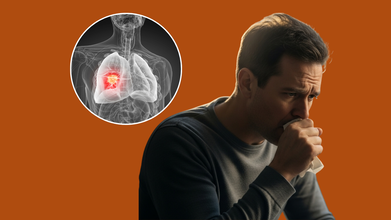- Health Conditions A-Z
- Health & Wellness
- Nutrition
- Fitness
- Health News
- Ayurveda
- Videos
- Medicine A-Z
- Parenting
- Web Stories
Can AI Diagnose Chronic Fatigue Syndrome In Patients? Hint, Your Gut Plays A Role In This

(Credit-Canva)
Although we have come a long way in medicine, the mysteries of the human body are still being discovered. Every day comes with a new discovery and better understanding of diseases, illnesses and conditions. However, have you heard about an illness that does not have a clear cause, way to diagnose or even cure?
Although this was a common issue in the past, hearing about a disease like this in today’s day and age is concerning. One such issue many people are battling, many without even knowingly, is chronic fatigue syndrome. However, new research shows that we may be able to diagnose it, through our gut, and with the help of AI. A new study done at Jackson Laboratories found that with the help of AI we may be able to help millions of people who go undiagnosed every year.
What Is Chronic Fatigue Syndrome?
The Centers of Disease Control and Prevention explains that Myalgic encephalomyelitis/chronic fatigue syndrome affects us in may different ways, this complex illness is severe, long-lasting and something that doesn’t get better with rest. People who have ME also report issues like poor sleep, dizziness, pain, and difficulty thinking.
A key symptom is post-exertional malaise (PEM), where even small amounts of physical or mental activity can make a person’s symptoms much worse. Because of this, many people with ME/CFS can't do their normal daily activities, and about one in four may be confined to bed for a period of time.
What makes this illness complex is the diagnosing it. Diagnosing ME/CFS is very difficult because there is no specific test for it. Its symptoms are similar to many other illnesses and can change over time, making it hard for doctors to recognize. This is one reason why many people go undiagnosed. In the U.S., it's estimated that as many as 3.3 million people have ME/CFS, but more than 9 out of 10 of them have not been officially diagnosed.
There is currently no cure for ME/CFS, but some symptoms can be managed. Patients, their families, and healthcare providers need to work together to create a plan that focuses on the most troubling symptoms.
Can AI Help Diagnose CFS?
The research shows that artificial intelligence (AI) could provide a much-needed breakthrough in diagnosing chronic fatigue syndrome (CFS), also known as ME. For many years, doctors have struggled to diagnose this condition because there are no clear lab tests for it. This study discovered that CFS disrupts the important connections between a person's gut bacteria, immune system, and metabolism.
By using AI to analyze these systems, doctors may soon have a reliable way to confirm a diagnosis, giving hope to the millions of people who suffer from this illness. The researchers also hope that by better understanding these connections, they can develop more effective, personalized treatments.
Gut-Immune Connection
The researchers used advanced AI to examine the complex relationships within the body. They looked at gut bacteria and the immune system and then matched their findings with the common symptoms of CFS, such as fatigue, chronic pain, and sleep problems. The AI was so effective that it was able to tell the difference between people with CFS and healthy individuals with 90% accuracy.
The study found that problems with the immune system could show how severe a person's CFS is, while the gut bacteria could help predict issues with sleep, emotions, and digestion. This is a huge step forward because it gives doctors real biological signs—or "biomarkers"—to look for. The study also suggests that the disease's effects get stronger over time, making an early diagnosis even more critical.
How Does This Affect CFS Treatment
The findings from this research open up exciting possibilities for new treatments. Since the gut bacteria and metabolism are always changing, the researchers believe it might be possible to treat the illness by making changes to a person's diet, lifestyle, or through specific medicines.
The study found clear patterns in the biological systems of people with CFS, which proves that the illness is not random but a real physical problem in the body. Researchers also believe these discoveries might be helpful for understanding and treating long COVID, as both conditions can happen after an infection and have similar symptoms. This new knowledge could eventually lead to more effective ways to manage and treat these complex and often misunderstood illnesses.
World Lung Cancer Day 2025: Why You Should NOT Ignore A Recurring Cough? Danger Of Overlooking Early Symptoms

Credits: Health and me
Lung cancer remains one of the deadliest forms of cancer worldwide, accounting for nearly one in five cancer-related deaths each year. What makes this cancer especially dangerous is how silently it advances. Many people miss the early signs or ignore them, believing they’re just symptoms of a lingering cold, allergies, or an old infection but on World Lung Cancer Day—observed every year on August 1—the message is clear, early detection can mean the difference between life and death.
First observed in 2012, World Lung Cancer Day was launched by the Forum of International Respiratory Societies (FIRS) in partnership with patient advocacy groups. The aim? To break the silence surrounding lung cancer, correct widespread misconceptions, and push for better early detection and prevention.
Despite advances in medicine, lung cancer continues to slip under the radar. Many associate it solely with smoking, overlooking other contributors like air pollution, genetic factors, or secondhand smoke. Moreover, stigma often deters patients from seeking help early especially non-smokers who don’t consider themselves at risk.
While a chronic cough might seem harmless, dismissing it as seasonal or due to pollution, the reality is that it could be your body’s early warning system. Lung cancer rarely causes symptoms in its earliest stages, which is why seemingly minor signs like a persistent cough or subtle breathlessness deserve closer attention. By the time more severe symptoms—like coughing up blood, wheezing, or unexplained weight loss—appear, the disease may already be in an advanced stage.
What makes lung cancer particularly dangerous is its ability to remain silent until it’s too late. This is why awareness and early screening, especially in high-risk groups, are crucial. Smokers and former smokers, people exposed to secondhand smoke or environmental toxins, and those with a family history should be especially vigilant. Even if you don’t fall into these categories, don’t ignore your instincts. If something feels off—get it checked.
When a Cough Isn't 'Just a Cough'
Dr. Rakesh Pandit, Senior Consultant & Head of Internal Medicine at Aakash Healthcare, emphasizes that we often brush off coughs that last beyond a week or two, that’s a mistake. “A recurring cough is not always just a leftover from the flu or a seasonal allergy,” he says. “It could point to asthma, acid reflux, lung infections, tuberculosis—or even early-stage lung cancer.”
Dr. Pandit adds that if a cough persists for over eight weeks in adults (or four weeks in children), it needs medical attention. And it’s not just about coughs—symptoms like breathlessness, chest pain, coughing up blood, wheezing, or unexplained weight loss should be immediate red flags.
In fact, lung cancer is often detected late because the symptoms can be vague or mimic other conditions, a long-standing cough, shortness of breath, and fatigue—these aren’t always alarming on their own, but together, they can signal something serious.
Technological advances in low-dose CT scans now allow for earlier detection, improving survival rates significantly. The five-year survival rate for early-stage lung cancer can be as high as 60%, compared to just 6% in advanced stages. That’s a major difference—and it all starts with paying attention to symptoms that seem small.
Also, it’s not just about cancer. Chronic coughing and breathlessness can be early signs of other serious conditions like COPD, pulmonary fibrosis, or even heart failure. So addressing them isn’t just about cancer prevention—it’s about taking charge of your overall respiratory health.
What Missed Symptoms Can Lead To?
Dr. Sachin Kumar, Director of Pulmonology & Critical Care Medicine at Sakra World Hospital in Bengaluru, recalls a case that perfectly illustrates the cost of late detection. A 48-year-old man visited a doctor for back pain. Painkillers didn’t work. An MRI revealed cancer in the spine—further tests showed the primary cancer was in the lungs. It had already spread.
“This is how deceptive lung cancer can be,” Dr. Kumar explains. “Often, the first symptoms don’t even involve the lungs. That’s why awareness is key.”
Why Lung Cancer Is Not Just a Smoker’s Disease?
One of the most dangerous myths about lung cancer is that only smokers are at risk. While smoking remains the number one cause, non-smokers aren’t safe either. Dr. Debanti Banerjee, Consultant at HCG Cancer Center, Kolkata, warns that more young adults, women, and non-smokers are being diagnosed than ever before.
“Increasingly, we’re seeing lung cancer in non-smokers—possibly due to genetic predispositions, air pollution, and environmental toxins,” she explains. “People must understand that anyone can get lung cancer, and everyone needs to be vigilant about symptoms.”
She adds, “Lung cancer doesn’t always shout—it often whispers. Catching it in stage 1 or 2 can mean curative treatment. Catching it at stage 3 or 4? That’s a different story.”
What Are The Environmental Triggers and Everyday Risks?
In addition to smoking and secondhand smoke, prolonged exposure to pollution, dust, biomass fuel (like wood or coal used for cooking), and occupational hazards (like asbestos) significantly increase lung cancer risk. People living or working in such conditions often develop chronic coughs from continuous lung irritation. Unfortunately, this persistent irritation can mask the early signs of something more dangerous.
“Especially in urban environments, we’re breathing in harmful particles every day,” Dr. Pandit says. “If you’re in a high-risk environment, you can’t afford to ignore a chronic cough or delay a check-up.”
What You Can Do To Prevent And Early Diagnosis?
Here’s the thing—lung cancer caught early is often treatable but because early symptoms are vague, diagnosis is frequently delayed. The solution lies in being proactive.
- Don’t dismiss persistent symptoms, especially coughs, breathlessness, fatigue, or weight loss.
- Get screened if you’re high-risk, this includes smokers, ex-smokers, people over 50, or those with a family history.
- Avoid triggers, stay away from secondhand smoke, reduce exposure to pollution, and use protective gear if working in hazardous conditions.
- Vaccinate for infections like tuberculosis and influenza can damage lungs and increase vulnerability.
- Annual health checks should be part of your routine, not just something you do when you’re sick.
“Most causes of a recurring cough are treatable if caught early,” Dr. Pandit says. “That’s why a cough that won’t quit needs more than just home remedies or over-the-counter syrup. It needs medical evaluation.”
When detected in its early stages, non-small cell lung cancer (NSCLC)—the more common and slower-growing form—can often be removed surgically or treated with radiation and targeted therapies. But in later stages, treatment gets more complicated and outcomes become uncertain.
Dr. Banerjee sums it up best, “We need to move beyond fear and stigma. Early diagnosis isn’t about being alarmist—it’s about giving people a fighting chance.”
The theme of World Lung Cancer Day isn’t just about awareness. It’s a call to action- to listen to your body, to challenge the assumptions around who gets lung cancer and to make preventive health a priority. So, if you or someone you know has a cough that keeps coming back, don’t wait.
NHS Prompts People To Watch Out For This Summer Skin Sign - 'Call Emergency Services Immediately'

(Credit-Canva)
As UK temperatures rise, more and more people are concerned about heat related illnesses and how to ensure they stay safe in this weather. In fact, in June of 2025, the UK National Health Service website had 31,524 visits within 48 hours as they issued a heat-health alert, compared to the 10,000 views they had just days prior. This helped many people be aware of their health and keep safe. However, temperatures are yet to relent, and One must stay careful.
With the UK currently experiencing very high temperatures, it's really important to know the signs of heatstroke, which can be quite dangerous. The NHS is telling people to dial 999 right away if they see a particular, serious symptom on someone's skin. This is a crucial step because heatstroke can be life-threatening if not addressed quickly.
Heatstroke: An Emergency Situation
Heat exhaustion is a milder condition, but it can quickly get much worse and turn into heatstroke if it's not dealt with fast. The NHS explains that if someone has heat exhaustion, they usually won't need emergency medical help as long as they can cool down within about half an hour. However, if that heat exhaustion turns into heatstroke, it's a completely different story – it becomes a real emergency. The health service is very clear: you should "call 999 now if you or someone else has signs of heatstroke." This isn't a suggestion; it's a direct instruction for a serious situation.
Key Heatstroke Symptoms to Watch For
One very important sign to look out for is skin that feels hot to the touch but isn't sweating, and it might look red. It's worth noting that this particular sign can be harder to spot on darker skin tones.
You also need to get emergency help if someone still isn't feeling well after being in a cool place for 30 minutes, having cooling treatments applied, and drinking fluids. Other signs of heatstroke that mean you should call 999 immediately include: an extremely high body temperature; a very fast pulse or heartbeat; breathing that is quick or difficult; feeling confused and having trouble moving in a coordinated way; having a seizure or fit; or passing out (losing consciousness).
If the person becomes unconscious while you're waiting for help to arrive, the NHS advises you to gently roll them onto their side into the recovery position.
Warning Signs of Heat Exhaustion
Before someone gets to the serious stage of heatstroke, there are earlier warning signs of heat exhaustion. Keep an eye out for these:
- Feeling very, very tired.
- Feeling dizzy.
- Having a headache.
- Feeling sick to your stomach or actually vomiting.
- Cramps in your arms, legs, and stomach.
- Sweating a lot, and your skin might look pale and feel clammy, or you might even get a heat rash.
- Your breathing or heartbeat might be fast.
- You'll likely have a high temperature.
- Feeling extremely thirsty.
- Feeling weak.
The NHS points out that these symptoms are generally the same for both adults and children, though children might also become irritable or cranky.
What to Do if Someone Has Symptoms
If you notice someone showing these signs of heat exhaustion, the most important thing is to cool them down right away and get them to drink fluids. The NHS recommends these four essential steps:
- Move them to a cool, shady spot. Get them out of the heat!
- Take off any extra clothing they don't need, like a jacket or thick socks.
- Encourage them to drink a sports drink, a rehydration drink, or just cool water. These drinks help replace lost salts and fluids.
Stay with the person until they start to recover, which should happen within about 30 minutes. However, if they don't get better after following these steps, you might need to call 999 for emergency help.
Night Owls Vs Early Birds - Your Genetics Could Be The Reason Why You Are A Morning Person

(Credit-Canva)
Do you love waking up with the sun, or do you prefer to stay up late? Your natural preference for sleeping and waking, called your chronotype, isn't just a habit—it's partly decided by your genes! A 2019 study published in the Nature Communications, involving nearly 700,000 people, has given us amazing new information about the genes that control our chronotype and how they might affect our mental and physical health.
Everyone falls somewhere on a spectrum: early risers on one end and late sleepers on the other. While things like seasons, where you live, and whether you're in a city can influence your chronotype, studies show that anywhere from 20% to 50% of your chronotype is decided by your genes from birth. Until recently, we didn't know much about these specific genetic factors.
Uncovering New Genetic Connections
By looking at genetic information from 250,000 people from 23andMe and 450,000 from the UK Biobank, researchers matched their genes to whether they identified as "morning" or "evening" people. Our study found an incredible 351 new genetic variations that help determine a person's chronotype. Before this research, we only knew about 24!
Past studies have suggested that night owls might have a higher risk of conditions like obesity, depression, and even type 2 diabetes. Our new discoveries about chronotype genes allowed us to investigate whether staying up and waking later directly causes these health problems.
How Your Genes Affect Your Body Clock
Your body clock is more than just a timekeeper; it's like an internal manager. It tells your body when to be active, when to feel hungry, and when to release important hormones. Most importantly, it signals when you should feel tired and go to sleep.
Some of the genetic changes found were in or near genes that are essential for the proper working of this body clock. This suggests that some of the differences between larks and owls come from small variations in their internal clocks. This could explain why owls often have body clocks that run a bit slower than larks.
Even though your body clock can run on its own, it usually runs a little longer than 24 hours. To stay in sync with the actual day and night, it gets clues from your surroundings, like temperature and light levels. These clues help "reset" the clock each day.
The researchers also found genetic variations in genes important for the retina, the part of your eye that translates light into signals for your brain. One experiment showed that artificial light at night affected owls' body clocks more than larks'. This might mean that owls' retinas are less effective at sensing and communicating light, making it harder for their clocks to stay in sync.
They also identified many other genetic variations that have appeared in studies of other health conditions. These include genes related to insulin levels, appetite, and how quickly your liver breaks down stimulants like nicotine. More research is needed to understand if these variants affect your body clock directly or through other behaviors.
Other Ways Genes Affect Our Health
This study significantly expanded our knowledge of the genes influencing whether you're a morning person. Many of these newly identified genes are involved in how our internal body clock works. The genes that were linked to being a morning person genuinely influence when you go to sleep and wake up, not just how long or how well you sleep.
The research suggests that having a genetic tendency to be a morning person might actually lead to a lower risk of mental health issues like depression and schizophrenia, and generally higher well-being.
© 2024 Bennett, Coleman & Company Limited

